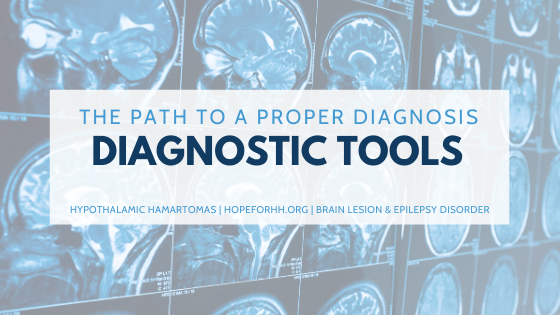
There are many tools a physician can use to diagnose a patient with epilepsy. With all these options, you would think it would be easy to find the answers they are looking for. Let me fill you in on a little secret about diagnostic testing. Testing is often used to rule out a specific diagnosis. Sometimes the test will yield a definite answer, which is wonderful. But the more complex the question the harder it is to find “the answer”. Finding the Hypothalamic Hamartoma (HH) is a definite answer, compared to other epilepsies which often go without an answer. When HH is located there are other items to consider and discuss with your medical team. Some of them are: which diagnostic test(s) to use, will it lead to a change in care and what will the risks, or emotional toll, be on you as the patient or your child.
The number of diagnostic tools has significantly increased over the years. There are: Computer Tomography (CT), Magnetic Resonance Imaging (MRI), Nuclear Medicine, Electroencephalogram (EEG), Magnetoencephalography (MEG) and Ultrasound; and they all break down into more specific tests. These tests often work hand and hand, offering a fuller picture of what is going on than one test by itself. Before the medical team can order any tests, the benefits must outweigh the risks and lead to a change in care. The tests that may be ordered for a first time visit to the emergency room, because of a seizure, will be vastly different from the tests that are needed to plan for surgery or long-term care. Understanding some of the different tests will help with the HH journey, decreasing some of the stress of not knowing what comes next.
As a parent of a child with HH, I wanted answers, but over the years I have found that there is often not an answer. This can be incredibly frustrating. Do I push for every test? At what point does the test no longer matter? When do the answers that might come from the test change or not change the treatment? These are discussions to have with your medical team to find that balance. I have learned to trust my “momma gut” and push when I feel there will be a benefit to the test.
Diagnostic tests are tools that, when used properly, can bring clarity to the HH journey. As this field evolves, more and more tests will be utilized together, with better post-processing, using stronger computers, to give a more in-depth understanding of the brain. To help navigate the tests that might be ordered and what to expect, Hope for HH created a cheat sheet with the basics of the diagnostic tools. You can find the details here.
Please reach out to Hope for HH at info@hopeforhh.org if you have questions about the process from a patient standpoint. We are here for you.





